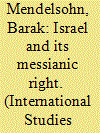| Srl | Item |
| 1 |
ID:
146182


|
|
|
|
|
| Summary/Abstract |
Why do states responsible for unleashing violent nonstate actors fail to halt them despite rising costs and, at best, marginal utility? I argue that a historical-institutionalist approach helps scholars understand these dynamics. I present five path-dependent mechanisms—change in the balance of power, spiraling perception of threat, ideological shift among the public, state penetration, and weakening of the principle of state primacy—that diminish the prospects of policy reversals. I then demonstrate the usefulness of path-dependency analysis in the case of Israel’s entanglement with the Jewish messianic Right. Applying the theoretical framework sheds light on the process that brought Israel prohibitive costs—undercutting the Israeli-Palestinian peace process, undermining the state’s international standing, and weakening the state’s authority and democratic nature—and made policy reversal, in line with the state’s national interest and its responsibilities as a member of the international society, highly unlikely.
|
|
|
|
|
|
|
|
|
|
|
|
|
|
|
|
| 2 |
ID:
151519


|
|
|
|
|
| Summary/Abstract |
The convergence of diverse global factors – food price volatility, the increased demand for biofuels and feeds, climate change and the financialisation of commodity markets – has resulted in renewed interest in land resources, leading to a rapid expansion in the scope and scale of (trans)national acquisition of arable land across many developing countries. Much of this land is on peripheral indigenous peoples’ territories and considered a common property resource. Those most threatened are poor rural people with customary tenure systems – including indigenous ethnic minority groups, pastoralists and peasants – who need land most. In Ethiopia large areas have been leased to foreign and domestic capital for large-scale production of food and agrofuels, mainly in lowland regions where the state has historically had limited control. Much of the land offered is classified by the state and other elites as ‘unused’ or ‘underutilised’, overlooking the spatially extensive use of land in shifting cultivation and pastoralism. This threatens the land rights and livelihoods of ethnic minority indigenous communities in these lowlands. This article argues that recent large-scale land acquisitions are part of state strategy for enforcing political authority over territory and people. It examines the implications of such strategy for indigenous ethnic minority groups, focusing particularly on the Benishangul-Gumuz region.
|
|
|
|
|
|
|
|
|
|
|
|
|
|
|
|